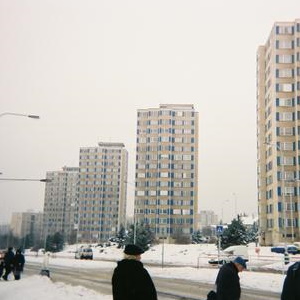Contemporary (1950 CE - Present)
Rudé Pravo, Music
The history of music, including rock, punk and heavy metal, forms a fascinating chapter in the history of everyday life in Cold War Eastern Europe.
Rudé Pravo, Youth Discontent
In Communist Eastern Europe much propaganda was directed toward young people, who party leaders correctly viewed as forces important for the future of the state.
Samizdat, Houses of Culture and Entertainment
During the Cold War era an interesting public space called "the house of culture" (or sometimes "the palace of culture") proliferated throughout the East Bloc.

Panelaks and Housing Estates
During the first half of the 20th century shortages of hygienic, affordable housing were common in Eastern Europe.
Rudé Pravo, Housing
Rudé Pravo was the Czechoslovak equivalent of the Soviet newspaper Pravda. Both were the official daily news publications of their respective Communist governments; both depicted the official version of truth about current events and conditions.
Samizdat, Tuzex
Tuzex, short for Tuzemský export (or domestic export), was a set of special stores in Communist Czechoslovakia. The Communist Party established Tuzex in 1957, in order to draw hard currency from citizens' pockets into the coffers of the state.
Samizdat, Five Year Plan
In 1986 the Czechoslovak Communist Central Committee approved its Eighth Five Year Plan since 1948, which stayed in effect, with modifications, until 1990.
Samizdat, Consumer Goods
Czechoslovaks watched the unfolding of perestroika [restructuring] in the Soviet Union and its slow introduction into their own economy with great interest, although there were obstacles to doing so.
Preparing for Martial Law in Poland
In August 1980, a worker's strike began in Gdansk, Poland in reaction to the struggling economy and massive shortages. In a compromise to resolve the strike, the Communist government legalized Solidarity, but this only increased tensions as the shortages failed to improve.
Economic Woes for the Warsaw Pact
The Warsaw Pact was based around the principle of cooperation and mutual assistance for its member states, including both military agreement and economic cooperation. In reality, the Soviet Union decided both the military and economic policies for all of the Warsaw Pact's member states.